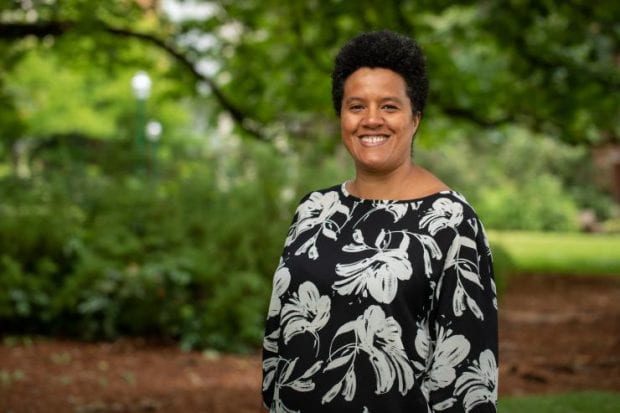Annual Brody Lecture set for Feb. 2
Baruch Brody, the former chair of Rice’s Department of Philosophy, was regarded as one of America’s leading bioethicists at the time of his death in 2018. Camisha Russell, assistant professor of philosophy at the University of Oregon, is regarded as one of the most important emerging scholars in the field today.

Camisha Russell, University of Oregon professor and ethics scholar, will deliver the Baruch A. Brody Lecture in Bioethics Feb. 2.
Fittingly, Russell will deliver the annual Baruch A. Brody Lecture in Bioethics Feb. 2, addressing two pressing topics with her talk: “Meeting the Moment: Bioethics in the Time of Black Lives Matter.” The lecture begins at noon via Zoom.
Russell’s work often focuses on the concept of race as a technology, asking how it’s constructed, how it’s used and what effects it has — an analysis reflective of Brody’s well-known pursuit of racial equality and social justice in his own work.
“In her book, she applies this analysis to assisted reproductive technologies,” said Rice professor of philosophy Elizabeth Brake of “The Assisted Reproduction of Race,” which Russell published in 2018. “For example, what are we to make of the fact that when choosing gamete donors, intending parents and medical staff who view race as a social construct will seek donors of the same race, often unreflectively?”
This work is one of the reasons Russell was selected as the recipient of the 2020-2021 Baruch A. Brody Award and Lecture in Bioethics, which is conferred by a trio of tight knit institutions: the Baylor College of Medicine Center for Medical Ethics and Health Policy, Houston Methodist and Rice’s own Department of Philosophy.
Brody, who shared a joint appointment at Rice and Baylor College of Medicine, served as the founding director of the Center for Medical Ethics and Health Policy at Baylor from 1982 until 2012. He also served as director of Houston Methodist’s joint venture with Baylor, the Biomedical Ethics Program, from 1985 until 2012.
Since 2013, Baylor’s Center for Medical Ethics and Health Policy has given the Baruch Brody Award to students in its ethics track, which Brody founded. And since his death, the three institutions Brody served have awarded the Baruch A. Brody Award & Lecture in Bioethics.
The $10,000 award honors mid-career scholars and offers the opportunity for their winning lectures to be published as featured articles in the American Journal of Bioethics. Holly Fernandez Lynch of the Perelman School of Medicine at the University of Pennsylvania was last year’s inaugural recipient.
Russell was selected for this year’s award by a cross-disciplinary committee from across the three institutions, who recognized her significant contributions to the topics of bioethics, critical philosophy of race and feminist philosophy.
“Russell’s work has contributed a new way to think about race in reproductive technology,” Brake said. “In her Brody Lecture she will broaden her focus to discuss how ideas of race function — and what effects they have — in a variety of medical contexts. She will make the case that race should be central to bioethics and not at the margins of inquiry. As we witness the disproportionate effects of the pandemic on African American and Hispanic communities, her topic could not be more timely.”
The Baruch A. Brody Lecture in Bioethics is free and open to the public. Registration is required.

